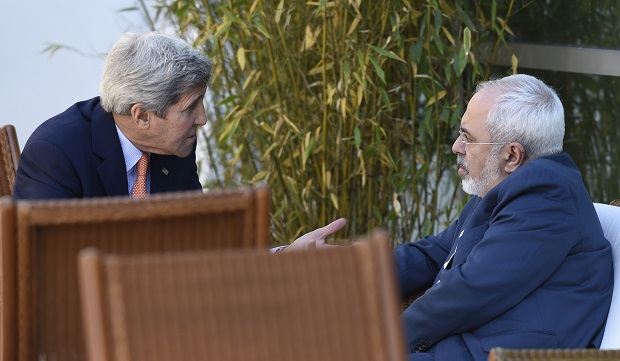US, Iran hold ‘intense’ nuclear talks a month before deadline

U.S. Secretary of State John Kerry, left, talks with Iranian Foreign Minister Mohammad Javad Zarif, in Geneva, Switzerland, Saturday, May 30, 2015. Top U.S. and Iranian diplomats are gathering in Geneva this weekend, hoping to bridge differences over a nuclear inspection accord and economic sanctions on Tehran. AP
GENEVA, Switzerland — A month away from a nuclear deal deadline, U.S. and Iranian diplomats tried to narrow differences over how quickly to ease economic penalties against Tehran and how significantly the Iranians must open up military facilities to international inspections. American officials described the session as “at times intense.”
The talks between U.S. Secretary of State John Kerry and Iranian Foreign Minister Mohammad Javad Zarif lasted six hours, in what officials described as the most substantive negotiating round since world powers and Iran clinched a framework pact in April.
Last month’s agreement left big questions unanswered, which weeks of subsequent technical discussions have done little to resolve. It was unclear how much progress Kerry and Zarif made before the Iranian delegation began leaving for Tehran, or if they fully rediscovered their momentum.
BACKSTORY: Iran denies agreement on military site inspections
Asked about completing the full accord by June 30, Zarif said, “We will try.”
His deputy, Abbas Aragchi, said lower-level officials would meet again in Vienna next week.
U.S. officials provided hints of what must have been a difficult dialogue, but said the encounter ultimately proved fruitful. American members of the negotiating team were not authorized to discuss publicly the private talks and spoke only on condition of anonymity.
World powers believe they have secured Iran’s acquiescence to a combination of nuclear restrictions that would fulfill their biggest goal: keeping Iran at least a year away from bomb-making capability for at least a decade. But they are less clear about how they will ensure Iran fully adheres to any agreement.
Various Iranian officials, including Ayatollah Ali Khamenei, the supreme leader, have pledged to limit access to or even block monitors from sensitive military sites and nuclear scientists suspected of previous involvement in covert nuclear weapons efforts.
READ: Obama defends Iran deal as ‘once-in-a-lifetime’ opportunity
The U.S. says such access must be guaranteed or there will be no final deal. A report Friday by the U.N. nuclear agency declared work essentially stalled on its multiyear probe of Iran’s past activities.
The Iranians are not fully satisfied, either.
The unresolved issues include the pace at which the United States and other countries will provide Iran relief from international sanctions — Tehran’s biggest demand — and how to “snap back” punitive measures into place if the Iranians are caught cheating.
President Barack Obama has used the “snapback” mechanism as a main defense of the proposed pact from sharp criticism from Congress and some American allies.
Exactly how rapidly the sanctions on Iran’s financial, oil and commercial sectors would come off in the first place lingers as a sore point between Washington and Tehran.
READ: FM: Iran could resume nuclear activities if West withdraws
Speaking ahead of Kerry’s talks with Zarif, senior State Department officials described Iranian transparency and access, and questions about sanctions, as the toughest matters remaining, and cited “difficult weeks” since the April 2 framework reached in Lausanne, Switzerland.
Iran insists it is solely interested in peaceful energy, medical and research purposes, though many governments around the world suspect it of harboring nuclear weapons ambitions. The U.S. estimates the Iranians are currently less than three months away from assembling enough nuclear material for a bomb if they chose to covertly develop one.